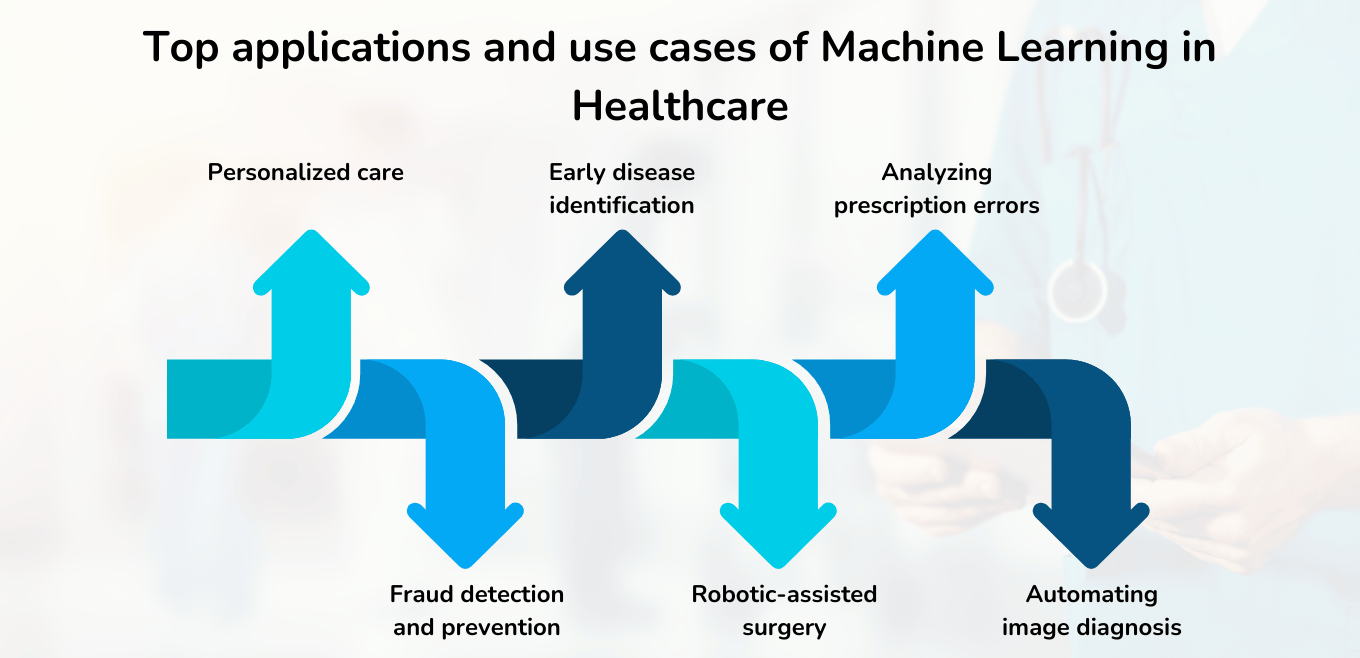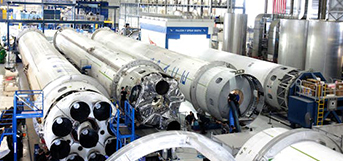According to Markets and Markets, AI in the global healthcare market is valued at $20.9 billion this year and is estimated to reach $148.4 billion in the next five years at a CAGR of 48.1%. Machine learning has the potential to revolutionize patient outcomes, improve care quality, expedite healthcare delivery, and—above all—make healthcare more affordable and accessible.
Applications of machine learning are expanding quickly, ranging from early disease diagnosis to predictive analytics and personalized medicine, thanks to the development of predictive healthcare models in recent years that can precisely spot trends, patterns, and subtle abnormalities that even the most seasoned professional may miss.
So what factors drive this massive growth of AI and ML in healthcare? What are the use cases and applications of machine learning for healthcare? What does adopting ML technology mean for healthcare businesses?
Let us find out answers to all such questions in the blog below.
How is healthcare evolving with Machine Learning?

Improving data handling is the first way machine learning is revolutionizing medicine. ML techniques are now used to process large amounts of data more cheaply. Healthcare technology accomplishes this by accelerating analysis, offering tools for prediction or discovery, and predicting possible hazards.
Diagnostics is the next area in which machine learning significantly influences the healthcare sector. Machine learning algorithms with access to global big data sets can improve patient diagnosis and disease identification. This can be used to predict future epidemics, identify disease indicators, and customize patient experiences.
In radiology, machine learning has shown itself to be just as accurate as human radiologists in interpreting medical imagery, including X-rays.
Precision medicine and machine learning are another area of machine learning in healthcare that shows promise. Predictive analytics in healthcare can analyze enormous volumes of patient data to determine which treatments are best for a given patient.
What are the benefits of Machine Learning in healthcare?
- Earlier diagnosis
Accurately detecting early disease symptoms through ML models has enabled earlier intervention, which is essential for successful treatment and improved patient outcomes.
- Development of drugs
The process of finding and developing new drugs is being sped up by machine learning, which is helping to optimize different steps of the procedure.
- Cutting down on medical expenses
Healthcare costs can be decreased while maintaining or even raising the standard of patient care by increasing operational effectiveness, decreasing errors, and improving patient outcomes.
- Improving the security and privacy of data
With the digitization of healthcare, protecting sensitive patient data is a top priority. Patient data is anonymized by machine learning models, guaranteeing adherence to data protection laws such as GDPR while preserving the data’s usefulness for study and analysis. Furthermore, sophisticated machine learning algorithms are used to alert healthcare companies of potential breaches and unauthorized access.
- Improving patient care
Only with the aid of machine learning can personalized medicine guarantee that every patient receives the treatment that is most appropriate for them, increasing its efficacy, decreasing side effects, and improving the patient experience. Real-time patient health monitoring using machine learning models can help improve long-term health outcomes by offering ongoing, data-driven care to support the management of chronic diseases and the early identification of possible health problems.
Top applications and use cases of Machine Learning in Healthcare
The role varies from optimizing healthcare efficiency to accurately diagnosing patient conditions. Both patients and medical professionals have benefited from the application of machine learning in healthcare. These significant machine-learning applications in healthcare innovation are changing the field and improving patient outcomes.


Personalized care
One of the main applications of machine learning in healthcare is the provision of individualized treatments. The analysis of patients’ medical history, symptoms, and tests, it enables the healthcare industry to provide individualized care. In medicine and healthcare, doctors can use ML to create personalized treatments and prescribe medications that target particular diseases in each patient. Furthermore, healthcare machine learning can help physicians determine whether a patient is prepared for required adjustments.
Fraud detection and prevention
Businesses can expedite the approval, processing, and payment of legitimate insurance claims by using machine learning for healthcare to identify fraudulent ones before they are paid. The use of machine learning in healthcare can stop patient data theft in addition to identifying insurance fraud. For instance, Harvard Pilgrim Health, a preeminent healthcare institution, uses AI and ML technologies to combat healthcare fraud. It makes use of ML-based fraud detection systems to detect suspicious activity and identify claims.
Early disease identification
In order to determine the best course of treatment and assist patients in securing a decent quality of life, healthcare providers must identify many diseases in their early stages. By comparing fresh data with existing data, machine learning (ML) helps physicians detect illnesses earlier.
Robotic-assisted surgery
The accuracy and speed of surgical procedures have been transformed by ML-powered surgical robots, one of the best examples of ML in healthcare. Complex surgical procedures can be carried out by these systems with a lower risk of pain, side effects, and blood loss. Recovery from surgery is also considerably simpler and quicker.
Analyzing prescription errors
One of the most deadly medical errors that frequently result in patient deaths is prescription errors. It entails giving the incorrect medication, or dosage, or neglecting to consider drug interactions. Every year, between 7,000 and 9,000 patients in the US alone pass away as a result of prescription errors. Healthcare machine learning-powered solutions can be a lifesaver in reducing such medical errors. Healthcare machine learning models examine past data and contrast new prescriptions with it. Prescriptions that don’t follow normal trends are marked so that physicians can review and modify them.
Automating image diagnosis
To identify anomalies in medical images, such as MRI or radiology scans that are controlled by a radiology information system, hospitals, and clinics employ machine learning. Image recognition helps physicians identify tumors, diagnose liver and kidney infections, improve the prognosis of cancer, and more. The UVA University Hospital’s tool is the best illustration of ML-powered visual perception. The tool uses machine learning (ML) algorithms to analyze children’s biopsy images and distinguish between environmental enteropathy and celiac disease with the same level of accuracy as medical professionals.
How can People10 help you adopt ML in healthcare?
Machine learning applications in healthcare are growing rapidly, and the sector is closely monitoring this development. As a result, businesses all over the world are using ML models and AI-driven solutions to enhance healthcare delivery.
Are you interested in using AI and ML to enhance your medical operations? Collaborate to accelerate time-to-value with machine learning development solutions and next-generation healthcare IT services. People10 – a software development company can be your go-to tech partner to realize your AI/ML in healthcare vision because of its dedicated software development teams and track record of completing successful projects.
We have worked on numerous healthcare projects that integrated cutting-edge technologies like AI, IoT, and ML.
If you want to take advantage of the full potential of AI and ML in healthcare consult our experts. We cater to your needs in the most tech-friendly manner.
Author
Shrutha Sekharaiah brings over 13 years of experience in delivering innovative, scalable solutions. His broad expertise in technology and focus on collaboration and mentorship drive the creation of robust systems enhancing efficiency and performance.




